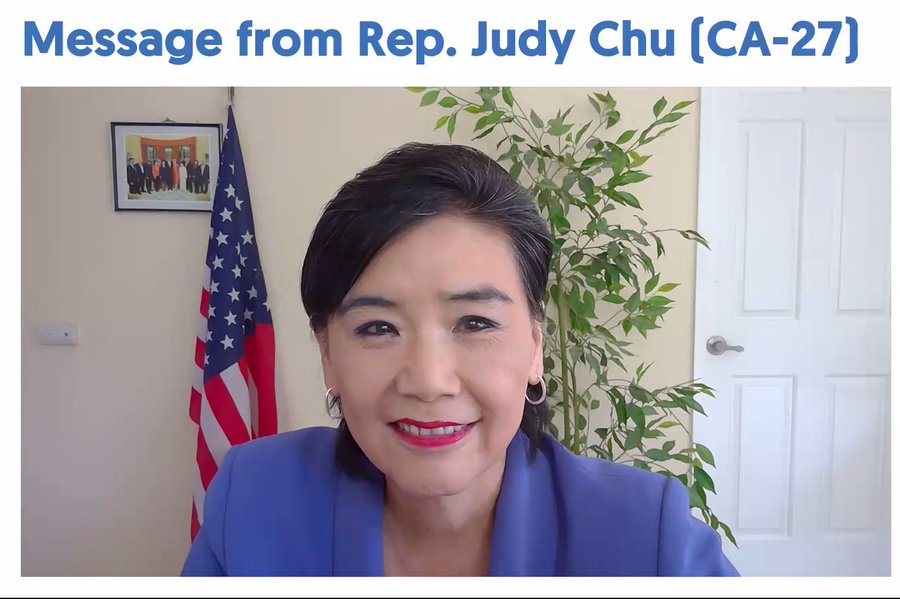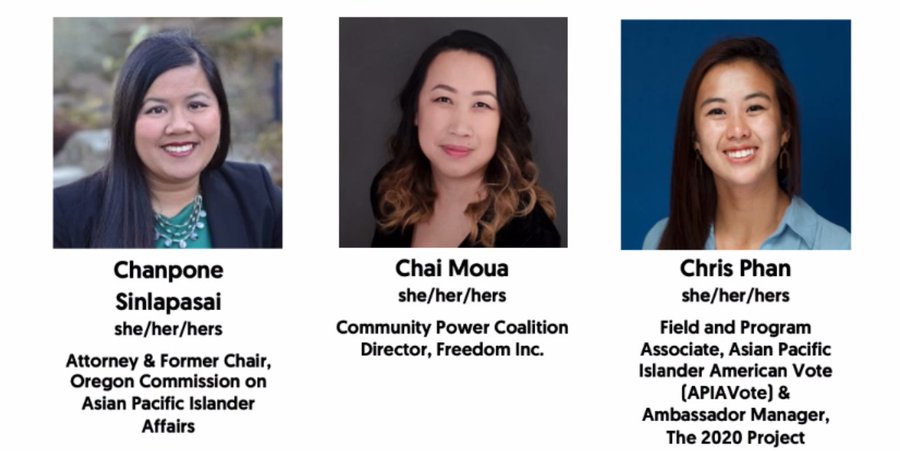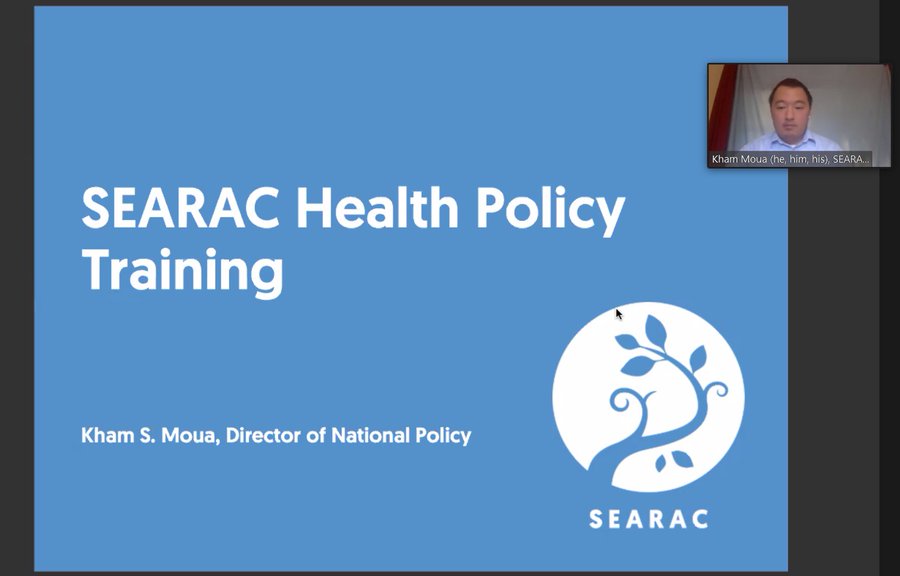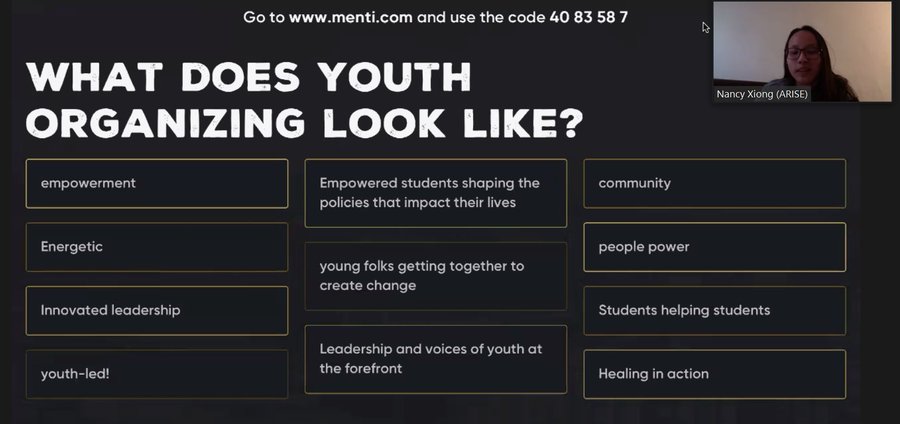October 7, 2020 IN: Our Voices, Staff Blog
SEARAC’s first-ever Digital Advocacy Training was a huge success!
THANK YOU to everyone who joined us for SEARAC’s First-Ever Digital Advocacy Training Week! More than 200 of you tuned in to our five virtual sessions celebrating the Southeast Asian American legacy, outlining the impact of civic engagement on our communities, and empowering a cohort of advocates to tell their stories to their elected officials. Check out some highlights from the week:

Day 1 kicked things off with a powerful panel discussion on “45 Years of the SEAA Community.” Moderated by SEARAC Acting Executive Director, Katrina Dizon Mariategue, we heard stories and insights from four SEAA organizers, leaders, and community members, including:
- KaYing Yang of the Coalition of Asian American Leaders
- Vimala Phongsavanh of the Congressional Progressive Caucus Center and board member at Laotian American National Alliance
- Sovanna Pouv of the Cambodian Mutual Assistance Association
- Jannette Diep of Boat People S.O.S. – Houston
During the panel, among many other important reminders, Vimala shared: “Despite everything that is happening and has happened, we have hope for the future. SEAAs are resilient and we are survivors.”
We were also thrilled to feature opening remarks from Congresswoman Judy Chu (CA-27), who highlighted her support of the SEAA communities through her co-sponsorship of the New Way Forward Act, which provides much-needed immigration reform. Check out a video of Congresswoman Chu’s remarks here.

On Day 2, our Senior Field Manager, Alyssa Tulabut, walked us through the basics of civic engagement and hosted a powerful panel discussion on Civics and Civic Engagement in 2020. Chris Phan of APIAVote shared the 2020 Asian American Voter Survey, which found that in a national sample of 1,569 Asian American registered voters, enthusiasm is high for the 2020 election, but about half of respondents were not contacted by either major party. SEARAC also launched our new Voter Guide to help SEAA communities better understand the presidential candidates’ positions and policies as we look ahead to November.
Ntxhais Chai Moua of Freedom, Inc. talked about the importance of reaching community members in spaces where they already are. For example, Freedom, Inc. has been hosting pop-up events in SEAA communities, delivering food and supplies to people in need and, at the same time, providing tablets so that they can register to vote or complete their census.
And Chanpone Sinlapasai signed us off with this powerful reminder: “When they push you down, rise back up!”

Day 3 of our Digital Advocacy Training Week was the first of our Advocacy 101 sessions, this one focusing on Health Policy and led by our Director of National Policy, Kham Moua. After inspiring opening remarks by Vattana Peong of The Cambodian Family, Kham walked us through some key health policy priorities for SEARAC, including:
- Poverty rates and uninsured rates among SEAA communities
- The need for disaggregated race and ethnicity data to better understand community health
- Impact of COVID-19 on the physical and mental health of AAPI communities
Participants were invited to think about their health, their family’s health, and the health needs of their communities and begin to translate those stories into concrete policy asks for Federal, state, and local officials.

On Day 4, we addressed Education Policy with our Education Policy Manager, Anna Byon, as well as three incredible guest speakers from the Alliance of Rhode Island Southeast Asians for Education (ARISE). ARISE’s activists shared their success in getting Rhode Island to pass the All Students Count Act and strategies for engaging youth leaders.
Anna walked us through some key education policy priorities for SEARAC, such as:
- Higher Education Act
- Federal appropriations
- Legislation and enforcement for civil rights
And they provided an important reminder that even after legislation is passed, there is a need for advocates to ensure that the laws are actually enacted on the ground. “There is a long way to go to ensuring equity and success for students,” Anna noted.

The last day of Digital Advocacy Week featured a session on Immigration Policy moderated by Nary Rath, SEARAC’s Immigration Policy Advocate. We were joined by Montha Chum of the Release MN 8 campaign, who shared that their anti-deportation campaign was successful because of the networks they built: community organizers, national organizations, lawyers, artists, and media worked together to end the deportation of three immigrants in Minnesota.
Nary shared that the numbers of Southeast Asian Americans being deported from the United States since 2016 have increased dramatically, and SEARAC’s policy priorities reflect the immediate and urgent community needs related to detentions and deportations. Key policies that immigration advocates can work to influence include:
- Ending unjust mandatory detention and deportation
- Strengthening naturalization programs
- Protecting family reunification

This week was an important reminder that our elected officials don’t just make laws! These leaders work for us, and there are many ways to collaborate with them, including writing op-eds for local publications, create budgets that fund community programs, and host town hall meetings on issues that impact their districts. We hope that all who attended our Digital Advocacy Training sessions this week now feel empowered to take your story to your legislators and find ways to work together to impact your communities.
We are so grateful to all of the guest speakers, moderators, staff, and — most importantly — the participants who made SEARAC’s first-ever Digital Advocacy Training week a huge success. If you were unable to attend any of our Digital Advocacy Training sessions and would like to receive a link to the recording, please email Gina Le at gina@searac.org.
Thank you to our sponsor, State Farm, for their generous support of SEARAC’s Digital Advocacy Training week!





